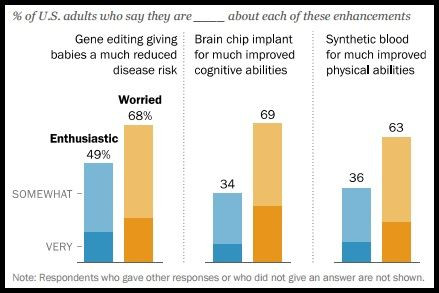Human Enhancement Freaks People Out, Study Finds; Designer Babies Might 'Meddle With Nature'

Fond as we are of superheroes on the big screen, most of us would stop short of actually becoming one via technology.
That’s the verdict issued by an extensive survey conducted by the Pew Research Center and released Tuesday. The Center polled over 4,000 Americans on a variety of issues related to advances in biomedical technology that may arrive in the near future — from using implanted brain chips to boost our thinking power to editing the genes of babies to eliminate hereditary flaws and diseases. The representative sample of Americans proved to be more careful than celebratory about these technological leaps.
Sixty-eight percent were somewhat or very worried about gene-editing, as opposed to 49 percent who saw themselves as at least somewhat enthusiastic about the prospect. Sixty-nine percent were also wary of brain implants and 63 percent felt the same about using synthetic blood transfusions to improve our strength, speed, and stamina. A similar percentage were taken aback at the thought of trying these technologies out on themselves or their future children.
"Developments in biomedical technologies are accelerating rapidly, raising new societal debates about how we will use these technologies and what uses are appropriate," said lead author Cary Funk, an associate director of research at Pew, in a statement. "This study suggests Americans' are largely cautious about using emerging technologies in ways that push human capacities beyond what's been possible before."

Through focus groups, the Pew Research Center also interviewed a diverse sample of 47 participants scattered across the country on why they felt uncomfortable about these technologies. While most were on board for using them to improve the lives of the already sick, some felt uneasy about taking it any further.
“I just think that there’s that place where you’re going beyond healthy, you’re going to super strength or computer [chip] thinking, [then] I think that's unnatural,” said one focus group participant, a 50-year-old woman from Phoenix. “I think that being healthy, productive, [and having a] good quality of life is where I would draw the line.”
Others invoked religion, both to support and condemn the use of these technologies. “If God wanted you to be sharp in the mind…then you would have been born that way. That’s the thought of some religious people,” said a 52-year-old black evangelical Protestant man from Atlanta. “But, I’m probably in that category where the Lord gave people the ability to come up with a way to help you [and it’s OK to take advantage of that].”
Among survey participants, people who were highly religious tended to more often view these technologies with suspicion, with 60 percent specifically believing that the use of synthetic blood would be meddling with nature compared to 36 percent of those with little religious commitment.
Others were scared about the potential for discrimination towards those unable to access these miraculous marvels, a fear that’s been in the public consciousness at least since 1997’s "Gattaca," a science fiction film which featured a genetically unhealthy protagonist born in a world where gene-editing became universal.
“I would [worry about creating a gap] in society between the haves and have nots,” said a 31-year-old black man from Boston. “Now the [haves] will have eliminated or eradicated or substantially reduced the risk of contracting any other illness or disease, while those that aren’t healthy are just left behind.“
Seventy-two percent of survey participants similarly worried that brain chips would increase inequality between the wealthy and poor, since they’d likely only be available to the latter at first.
Despite these concerns, though, the majority of Americans — 67 percent — viewed science as a net positive for society, especially when it came to health and medicine. Slightly more than half felt the same about technology in general.
Already, gene-editing techniques like CRISPR are helping scientists understand and possibly someday treat devastating genetic diseases like muscular dystrophy, while the National Institutes of Health announced in 2015 that it would attempt the first synthetic blood transfusions in people sometime in 2017. Such an advance would greatly extend the lifespan of blood banks and those with rare blood disorders.
More than anything else, the overall findings indicate a need to balance out the risks and benefits of these upcoming technologies in the eyes of the general public, even as they provide newfound hope to countless others.
Source: Funk C, Kennedy B, Sciupac E. U.S. Public Wary of Biomedical Technologies to ‘Enhance’ Human Abilities. Pew Research Center. 2016.
Published by Medicaldaily.com



























